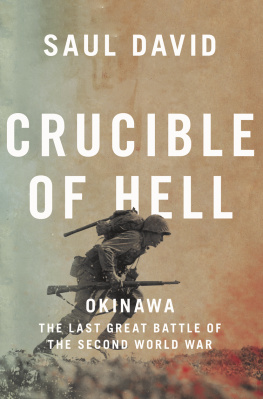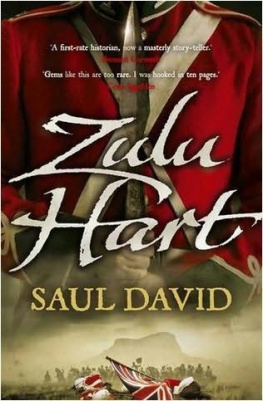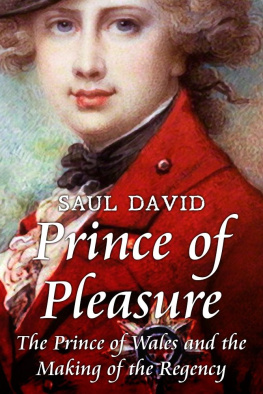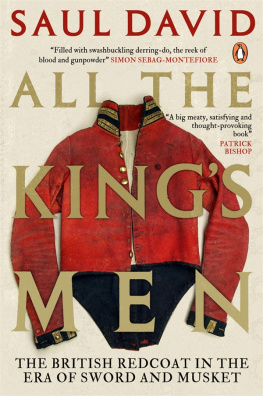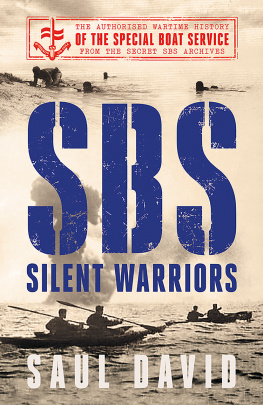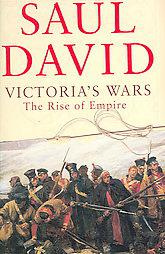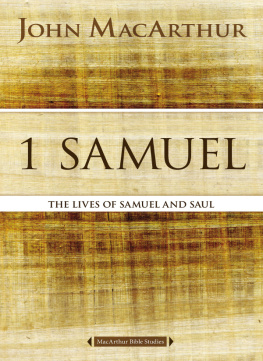Saul David - Military Blunders
Here you can read online Saul David - Military Blunders full text of the book (entire story) in english for free. Download pdf and epub, get meaning, cover and reviews about this ebook. year: 2012, genre: History. Description of the work, (preface) as well as reviews are available. Best literature library LitArk.com created for fans of good reading and offers a wide selection of genres:
Romance novel
Science fiction
Adventure
Detective
Science
History
Home and family
Prose
Art
Politics
Computer
Non-fiction
Religion
Business
Children
Humor
Choose a favorite category and find really read worthwhile books. Enjoy immersion in the world of imagination, feel the emotions of the characters or learn something new for yourself, make an fascinating discovery.
- Book:Military Blunders
- Author:
- Genre:
- Year:2012
- Rating:5 / 5
- Favourites:Add to favourites
- Your mark:
- 100
- 1
- 2
- 3
- 4
- 5
Military Blunders: summary, description and annotation
We offer to read an annotation, description, summary or preface (depends on what the author of the book "Military Blunders" wrote himself). If you haven't found the necessary information about the book — write in the comments, we will try to find it.
Military Blunders — read online for free the complete book (whole text) full work
Below is the text of the book, divided by pages. System saving the place of the last page read, allows you to conveniently read the book "Military Blunders" online for free, without having to search again every time where you left off. Put a bookmark, and you can go to the page where you finished reading at any time.
Font size:
Interval:
Bookmark:
Saul David is the author of numerous books, including All the Kings Men and the Zulu Hart novels. He is professor of War Studies at Buckingham Univeristy and also a TV presenter.
Also by Saul David:
The Homicidal Earl: Lord Cardigan
Mutiny at Salerno: An Injustice Exposed
Churchills Sacrifice of the Highland Division: France 1940
The Indian Mutiny
Zulu
Zulu Hart
Victorias Wars
The Rise of Empire
All the Kings Men: the British Soldier from the
Restoration to Waterloo
Hart of Empire
Saul David

Constable & Robinson Ltd
5556 Russell Square
London WC1B 4HP
www.constablerobinson.com
First published in the UK by Robinson,
an imprint of Constable & Robinson Ltd, 1997
This revised edition published by Constable, an imprint of Constable & Robinson Ltd, 2012
Copyright Saul David 1997
The right of Saul David to be identified as the author of this work has been asserted by him in accordance with the Copyright, Designs and Patents Act 1988.
All rights reserved. This book is sold subject to the condition that it shall not, by way of trade or otherwise, be lent, resold, hired out or otherwise circulated in any form of binding or cover other than that in which it is published and without a similar condition including this condition being imposed on the subsequent purchaser.
A copy of the British Library Cataloguing in
Publication Data is available from the British Library
ISBN: 978-1-78033-493-6 (paperback)
ISBN: 978-1-78033-861-3 (ebook)
Printed and bound in the UK
1 3 5 7 9 10 8 6 4 2
Printed and bound in the UK
To Tristan
Forward the Light Brigade!
Was there a man dismayd?
Not tho the soldier knew
Some one had blunderd
Theirs not to make reply,
Theirs not to reason why,
Theirs but to do and die.
Thus reads the best-known verse of Alfred Lord Tennysons famous poem The Charge of the Light Brigade, written in the aftermath of one of the most notorious blunders in military history when a brigade of British light cavalry was sent into a valley bounded on three sides by Russian soldiers and cannon. Of the 676 riders who charged, only 195 were still in the saddle when the action was over. Their fallen comrades had paid the price, Tennyson believed, for errors made by their commanders.
Tennyson was right to pin the blame on Lords Raglan and Lucan for that disastrous charge in 1854. But military disasters are not caused solely by incompetent field commanders: inadequate planning (the Dieppe Raid), interfering politicians (Hitler at Stalingrad), overconfidence among officers and men (Custers Last Stand), and even a poor fighting performance by the soldiers themselves (the Americans at Kasserine Pass) are all contributory factors. Most catastrophes are caused by multiple blunders not to mention the talents and tenacity of the opposition but one tends to stand supreme. For the sake of simplicity, therefore, I have divided the book into five themed chapters, each containing six case studies of disasters with a similar cause. Some are well known; others less so. But they all have one thing in common: they were largely self-inflicted.
Much has been made of the poor martial performance of certain nations, particularly in modern times. Contrary to popular belief, however, Italy does not have a monopoly when it comes to battlefield ineptitude. If this books proves anything, it is that no power, however vaunted its reputation, is immune from military catastrophe. The Roman Empire, medieval France, imperial Britain, the United States, Spain, Germany and Israel (see Afterword) have all suffered the ignominy of avoidable defeat.
Since this book was first published in 1997, it has gone into countless reprints and been translated into languages as diverse as German, Hungarian, Polish, Swedish and South Korean. The latter publication was the result of an email from a Colonel Park of the Republic of Korea (ROK) Army, a former commander of the Seoul University Officers Training Corps (OTC), who said the German edition had made a great impression on him, and that a Korean translation would contribute to the improvement in the ROK armys combat ability. Naturally I was flattered. But only up to a point: the purpose of the book was never to prepare armies for war; rather to warn politicians of the many pitfalls if they do take that fatal step.
The biggest sales of this book outside Britain and the United States have been, oddly enough, in Germany. A few years ago, during an interview for German TV, I was asked why a country that had turned its back on war was so fascinated by military blunders. I replied, somewhat mischievously, that it must have something to do with the fact that German troops were invariably the opposition. It was a throwaway line, but strangely true: of the 30 case studies, a third involve German opposition (if we extend the term to include the German tribes of the 1st Century AD, Prussia in the 19th Century and the Austro-German troops that fought at Caporetto in 1917). The only other serial opponents in the case studies were the Boers of South Africa (three times), the Russians, the Turks and the English/British (all twice). The selection is, of course, arbitrary and heavily weighted towards British military disasters (there are 16 in total, not including the English at Bannockburn); yet the point holds good that the quality of the opposition is a factor in many serious military setbacks.
Can we learn from history? Certainly, though modern politicians seem stubbornly oblivious to the lessons of the past. Take Afghanistan. The unprovoked and ultimately disastrous British invasion of Afghanistan in 1839 was undertaken, like the 2003 incursion into Iraq, with regime change in mind: to replace a seemingly anti-British and pro-Russian ruler, Dost Mohamed, with a pro-British one, Shah Shuja. There, too, the plan was to withdraw British bayonets as soon as the country was pacified. It never happened, and tens of thousands of British, Indian and Afghan lives were lost in the ensuing three years of conventional and guerilla war. The end result: British troops finally withdrew, having first blown-up Kabuls magnificent covered bazaar, and Dost Mohamed resumed his rule.
Yet the lesson was not heeded, and three times since Afghanistan has been invaded by foreign troops: twice by the British and once by the Russians. Now we are back again, ostensibly at the request of a pro-Western government Kabul government trying to find its feet. And once again, as in Iraq, the very presence of foreign troops is making the security situation worse.
In Iraq, too, there was ample warning from history. It was Britain, after all, which effectively created modern Iraq when it demanded a mandate over the former Ottoman provinces of Basra, Baghdad and Mosul in the aftermath of the First World War. This was partly because of Iraqs strategic importance at the head of the Persian Gulf, but chiefly because of oil: huge reserves had been discovered in both Iraq and Persian (modern Iran).
Within months, angry at the imposition of British rule, the Iraqis rebelled in Mosul and along the Euphrates. Railways were cut, towns besieged and British soldiers murdered. The British reacted harshly, dispatching punitive expeditions to burn villages and exact fines. They also used planes to bomb and strafe strongholds. By the end of 1920 a shaky peace had been restored, and by mid-1921 the throne of Iraq had been offered to Emir Feisal, son of the Sharif of Mecca, who had fought with Lawrence of Arabia. But Feisal proved less pliant than Britain had hoped, and in 1932 Iraq joined the League of Nations as an independent state. In 1958, Feisals grandson was ousted in a coup that established a republic. And there Britains interference in the internal affairs of Iraq came to an end.
Next pageFont size:
Interval:
Bookmark:
Similar books «Military Blunders»
Look at similar books to Military Blunders. We have selected literature similar in name and meaning in the hope of providing readers with more options to find new, interesting, not yet read works.
Discussion, reviews of the book Military Blunders and just readers' own opinions. Leave your comments, write what you think about the work, its meaning or the main characters. Specify what exactly you liked and what you didn't like, and why you think so.


